期中Unit 1-Unit 5 重点知识总结与归纳(共有PPT133张)
文档属性
| 名称 | 期中Unit 1-Unit 5 重点知识总结与归纳(共有PPT133张) | 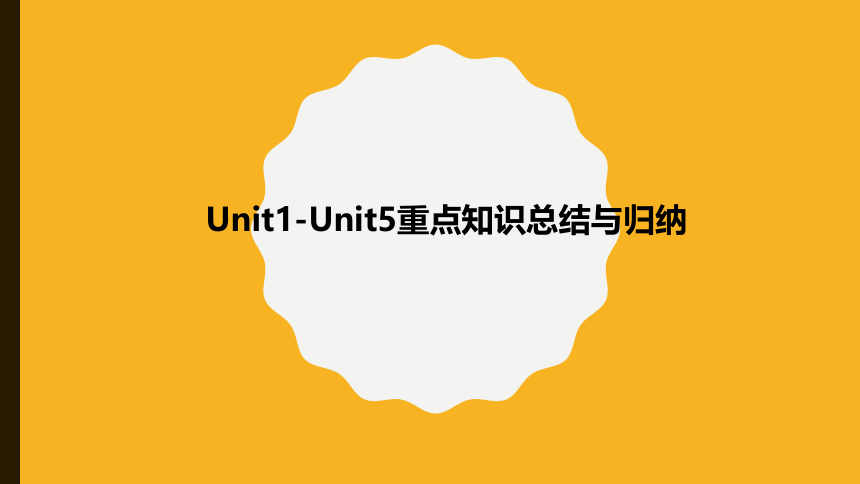 | |
| 格式 | pptx | ||
| 文件大小 | 2.5MB | ||
| 资源类型 | 教案 | ||
| 版本资源 | 人教新目标(Go for it)版 | ||
| 科目 | 英语 | ||
| 更新时间 | 2022-04-12 09:22:46 | ||
图片预览

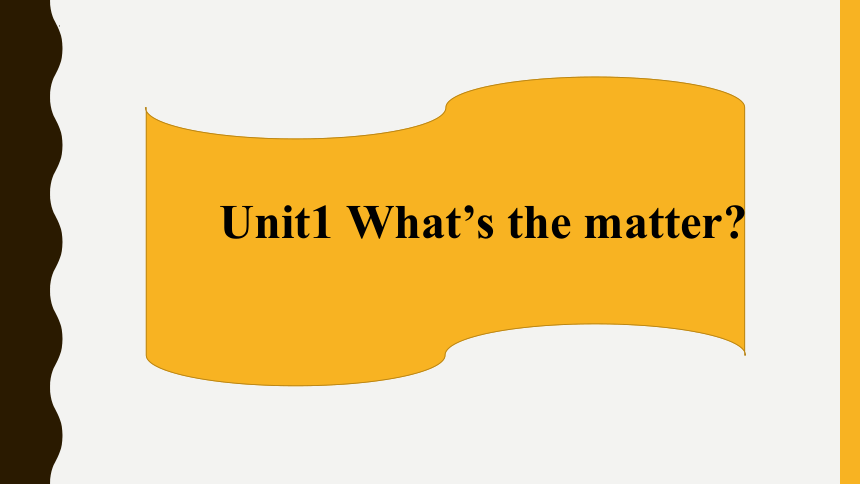
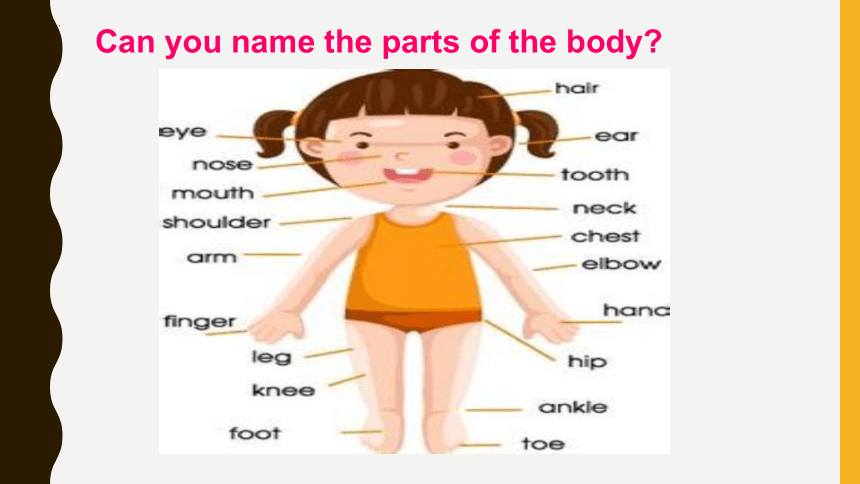
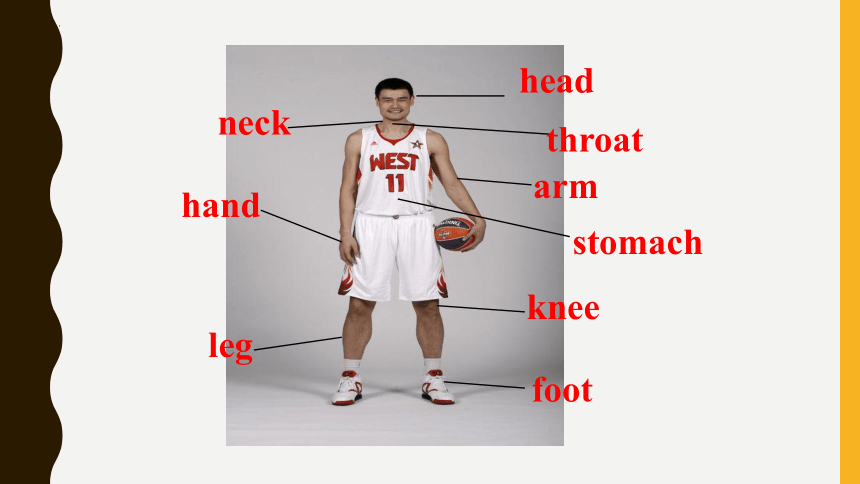
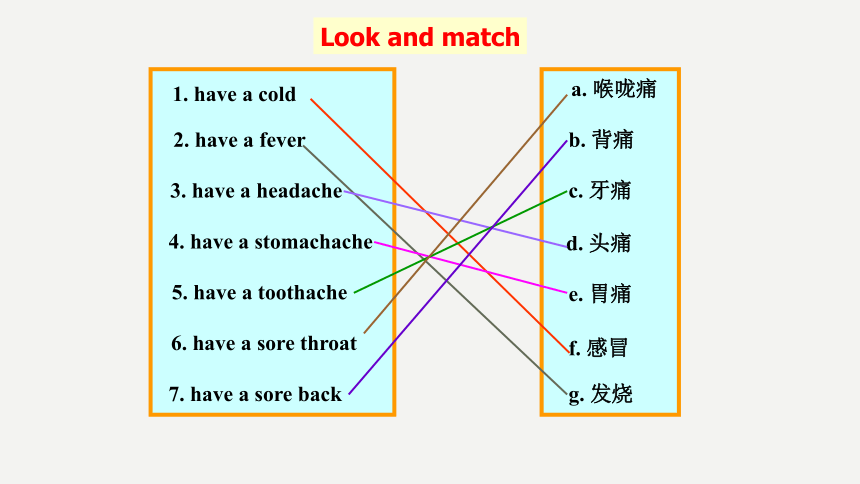
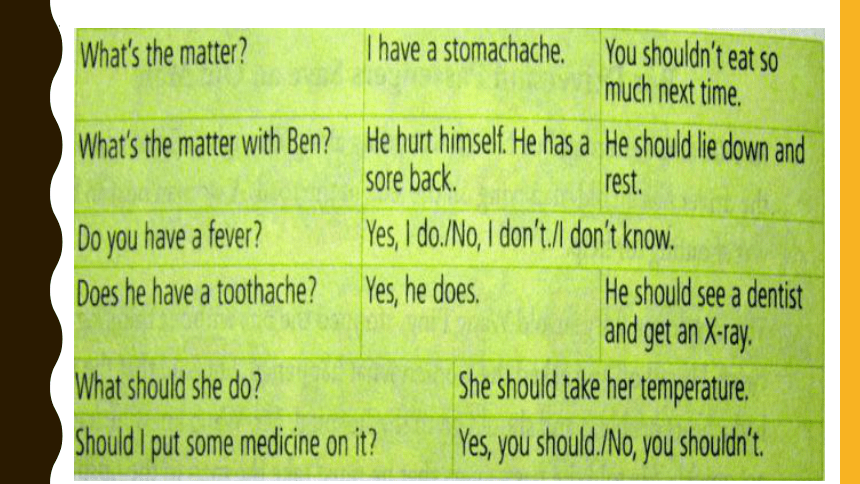
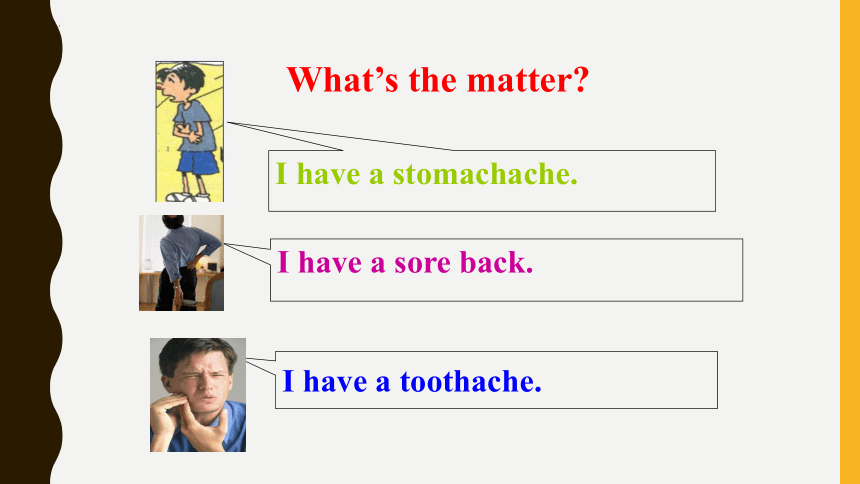
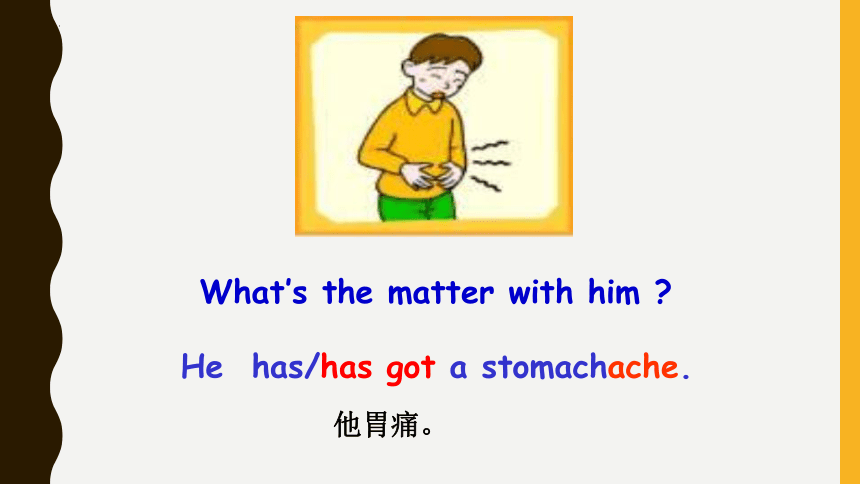
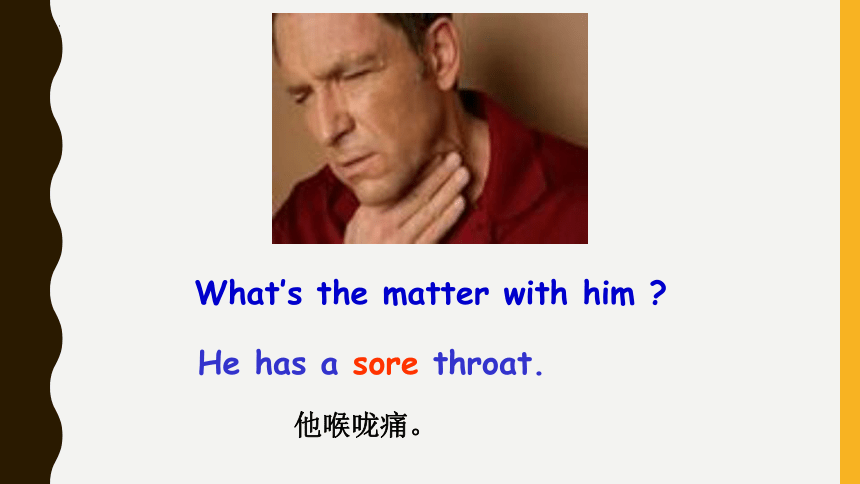
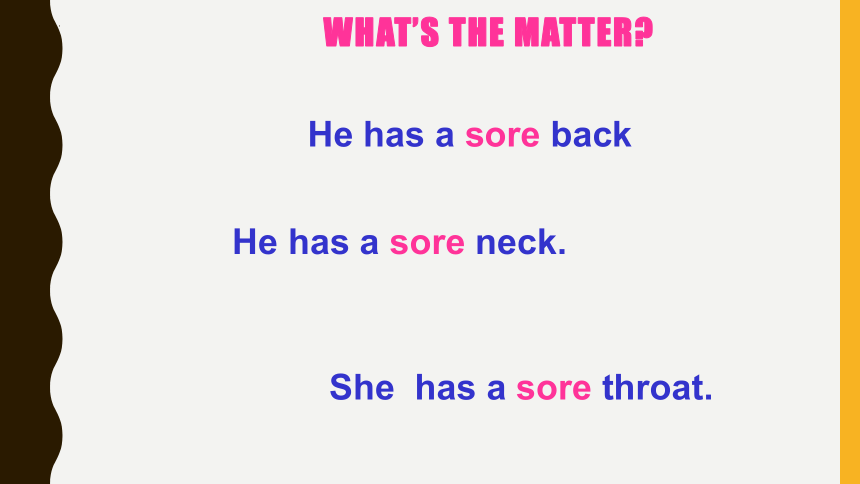
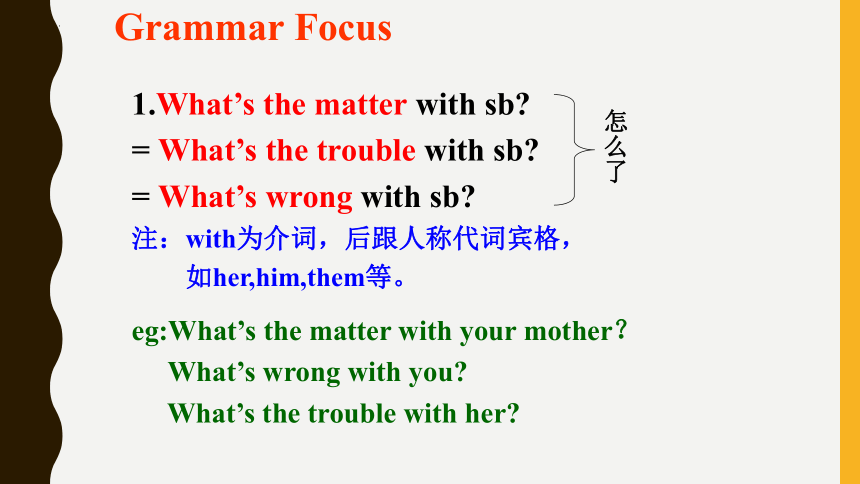
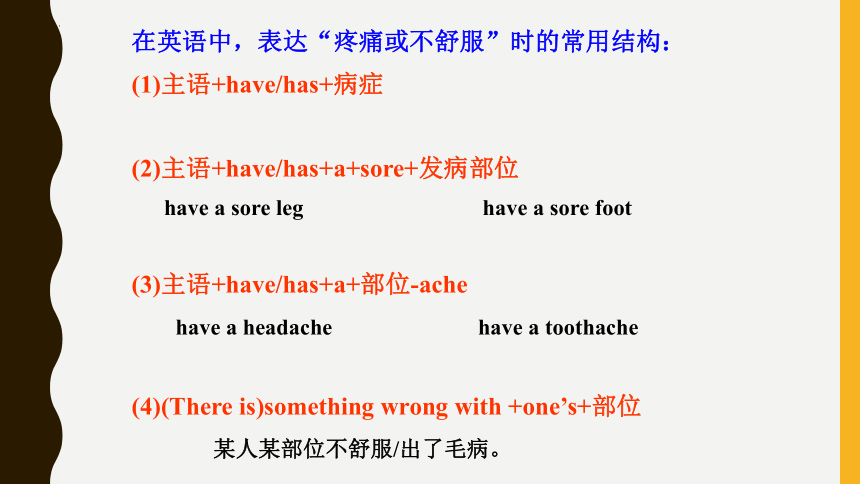
文档简介
(共133张PPT)
Unit1-Unit5重点知识总结与归纳
Unit1 What’s the matter
Can you name the parts of the body
head
arm
foot
leg
hand
neck
knee
stomach
throat
1. have a cold
2. have a fever
3. have a headache
4. have a stomachache
5. have a toothache
6. have a sore throat
7. have a sore back
a. 喉咙痛
b. 背痛
c. 牙痛
d. 头痛
e. 胃痛
f. 感冒
g. 发烧
Look and match
I have a sore back.
I have a stomachache.
I have a toothache.
What’s the matter
What’s the matter with him
He has/has got a stomachache.
他胃痛。
What’s the matter with him
He has a sore throat.
他喉咙痛。
He has a sore back
He has a sore neck.
She has a sore throat.
what’s the matter
Grammar Focus
1.What’s the matter with sb
= What’s the trouble with sb
= What’s wrong with sb
注:with为介词,后跟人称代词宾格,
如her,him,them等。
eg:What’s the matter with your mother?
What’s wrong with you
What’s the trouble with her
怎么了
在英语中,表达“疼痛或不舒服”时的常用结构:
(1)主语+have/has+病症
(2)主语+have/has+a+sore+发病部位
have a sore leg have a sore foot
(3)主语+have/has+a+部位-ache
have a headache have a toothache
(4)(There is)something wrong with +one’s+部位
某人某部位不舒服/出了毛病。
-What’s the matter
-I have a …
-Maybe you should …
-That’s a good idea./
That sounds like a good idea. /
I guess I should./
Yes, you’re right.
You should
I have a cold. What should I do
stay in bed .
have a good rest.
lie down and rest.
wear warm clothes.
drink lots of water.
drink hot tea.
take some medicine.
--What shouldn’t he do
--I think he shouldn’t …
shouldn’t = should not
He shouldn’t
drink cold drink.
eat ice cream.
eat hot food.
talk too much.
talk loudly.
He has a sore throat
1. — What’s ________
— I’ve got a headache.
A. the wrong B. the mater
C. trouble D. matter
2. — Lucy has a toothache.
— She should ________.
A. go to the movies B. go to the aquarium
C. go to see the dentist D. go sightseeing
3. If you have a sore throat, you should
drink some hot tea ______ some honey.
A. with B. in C. on D. has
B
A
C
I. 单项选择
4. I’m a little _____. I want to drink
something.
A. hungry B. thirsty
C. tired D. angry
5. We should ______ a balanced diet.
A. eat B. to eat
C. eats D. eating
6. If Jim is tired, he should ________.
A. have a good rest B. drink hot water
C. see a dentist D. exercise much
A
B
A
at, don’t, very, moment, the, feel, well, I
2. the, what’s, your, pet, matter, little, with
3. very, study, sometimes, 3 am, until, late, I
I don’t feel very well at the moment.
What’s the matter with your little pet
I study very late, sometimes until 3 am.
Ⅱ. 连词成句
4. had, lie, you, and, when, better, have,
rest, you, down, are, tired, a
5. that, to, sorry, I’m, hear
You’d better lie down and have
a rest when you are tired.
I’m sorry to hear that.
Ⅲ. 选词填空
see a dentist have some drinks,
has got a fever listen to music
early late
1. If you are stressed out, you should stop
working and try to ______________.
2. — Are you thirsty
— Yes, I want to _________________.
have some drinks
listen to music
3. My friends has got a toothache, so I tell her to ____________.
4. It’s good to sleep ______ and get up _______ in the morning.
5. Mr. Green doesn’t feel well. He ______________.
early
early
has got a fever
see a dentist
ⅳ.句型转换
1. She feels tired. (就划线部分提问)
______ ______ she _____
2. He has a sore back. (改成一般疑问句)
____ he ____ a sore back
3. You should eat more meat.
(改成否定句)
You _________ eat more meat.
How does
feel
Does
have
shouldn’t
4. She will stay in Shenzhen for nearly
three months. (对划线部分提问)
_____ _____ will she stay in Shenzhen
5. I have a pain in my head.
(改成同义句)
I _____ ___ _________.
How long
have a headache
Ⅴ. 翻译句子
1. 牛奶能帮助你保持健康的身体。
Milk can _______ you ______have
a healthy body.
2. 我爸爸告诉我好好学习英语。
My father _______ me ______ study
English well.
3. 我妈妈说我应该晚饭尽量少吃肉。
My mom said that I should ___ ____
eat less meat for dinner.
help to
tells to
try to
4. 不要太疲劳, 不然会使你生病的。
Don’t ______ too tired or it will
______ you sick.
5. 我相信每天晚上8个小时的睡眠
很重要。
I ______ that it’s _________ _____
sleep 8 hours each night.
be
important to
believe
make
Unit2 I’ll help to clean up the city parks
be used to 意为“习惯于”,其中to是介词,其后要接名词或V-ing形式。
他习惯步行上学。
He is used to walking to school.
used to 意为“过去常常做某事”。+do
I used to live in London.
我过去一直住在伦敦。
一、快速说出下列单词或短语。
1. 打扫(或清除)干净 __________
2. 欢呼;喝彩(v. ) __________
3. 义务做,自愿做 (v. )
志愿者(n.) __________
4. 分发 __________
5. 想出 __________
6. 曾经 __________
clean up
cheer
volunteer
give out
come up with
used to
volunteer to do sth.
义务自愿做某事
cheer up 使振奋起来
7.张贴__________
8.残疾人 __________
9.在...岁时 ___________
10.影响,有作用 ________________
11.参加...选拔 __________
12.一种满足感__________
13.建立 __________
14.推迟__________
15.打电话__________
put up
disabled people
at the age of ...
make a difference
try out
a feeling of satisfaction
set up
put off
call up
16.修理 __________
17.对...感到激动 ___________
18.像 ________________
19.赠送 _____________
20.能 _____________
21. 帮助 _____________
22.由于_____________
fix up
be excited about
take after
give away
be able to
help out
because of
1.由put引导的短语
put away
put on
put up
put off
put into
put down
put out
把……放好
穿上,把……放在……上
举起,表现出,张贴
推迟,拖延
把……放入,把……翻译成……
记下,放下
放出,伸出
2. 由give引导的短语
give up
give in
give out
give away
give back
give off
放弃
屈服,让步
分发,散发;用尽,耗尽
捐赠,赠送;分发
归还,恢复
发出,放出
3.由call 引导的短语
call on
call up
call in
call at
call for
访问(某人);号召;要求
打电话给……;使人想起……
找来,请来
访问(某处);(车,船等)停靠(某处)
需要,要求
4.由take 引导的短语
take back
take after
take away
take down
take up
take over
take off
拿回;使疑惑
像……
拿走,减去
写下,记下;拆卸
占据空间
接过……;接管
脱下;飞机起飞
5. 由look 引导的短语
look after
look for
look at
look into
look through
look out
look out of
look up
look like
照顾,照料
寻找,找……
看……
调查;向……里看
浏览,快速地看
小心
向……外看
查找,查询;向……上看
看起来像……
观察下列不定式在句中的作用。
1. To see is to believe.
主语,表语
2. Tom wants to see an alien.
宾语
3. My brother got up early to watch the
final soccer game on TV.
目的状语
4. He was too excited to say a word.
结果状语
5. The sad movie made us cry.
宾语补主语
6. It is important for us to drink enough
water.
真正的主语
1. 做动词宾语。常见动词有would
like, want, help, learn, hope, decide,
volunteer。
动词不定式用法小结
e.g. We don’t _____________ too much
money.
我们不想花费太多钱。
want to spend
2. 作宾语补足语。常见动词有ask,
want, tell, invite, like, hate。
e.g. Mr. Li ________________________
the text.
李老师让学生们抄写课文。
asked the students to copy
3. 作目的状语。
e.g. Jack turned his head around
to look at people.
杰克转过头看向人群。
e.g. Claire missed a great chance to
make his dream come true.
克莱尔错过了实现梦想的机会。
4. 作后置定语。
5. 动词help及一些役使动词后面常省略to。
e.g. My mother wouldn’t _______________
_____________.
妈妈不会让我去看电影的。
let me go to
the movie
6. It做形式主语,真正的主语为后面的不定式。
e.g. 保护环境对我们来说很重要。
It is important for us to protect the environment.
( )1. Changing schools made a big difference ______ his life.
A. on B. at C. to D. for
( )2. My friend Tom volunteered ______ in the countryside two years ago.
A. to work B. work
C. working D. works
C
A
( )3. They often help ______ sick children in the children’s hospital.
A. cheer up B. clean up
C. set up D. make up
( )4. My cousin has difficulty ______ English newspapers.
A. read B. reads
C. reading D. to read
A
C
( )5. My computer doesn’t work. Could you help ______ it
A. repair B. buy C. raise D. open
( )6. How nice these pictures are! Please _______ on the wall.
A. put it up B. put up it
C. put up them D. put them up
A
D
( )7. —We shouldn’t read in the sun.
—______. It’s bad for our eyes.
A. Sorry to hear that B. That sounds great
C. You’re right D. I don’t think ( )8. The girl is ______, so she needs a guide dog to help her.
A. sick B. blind C. tired D. sad
C
B
Ⅰ. 根据句意及所给汉语提示,写出句中所缺单词。
1. Many people stood up and ________ (欢呼) when that movie star walked into the hall.
2. Tom __________ (义务做) to work at the old people’s home once a week last year.
cheered
volunteered
3. We saw some ________ (标志) around the lake. They say, “No swimming in the lake.”
4. There are ________ (通告) about where to park (停车).
5. Tom didn’t feel ________ (孤独的) because he made new friends here.
signs
notices
lonely
1. Who will _______________ (自愿读) these words for us
2. The girl often _____ her mother ____ the dishes (帮妈妈洗餐具) on weekends.
Ⅱ. 完成句子
helps do
volunteer to read
3. We ______ her ________ (邀请来) to our party.
4. The old man had _______________
(无事可做) every day.
nothing to do
asked to come
Ⅲ. 根据括号内的要求完成下列各题,每空一词。
1. They arrived early so that they could have enough time to prepare. (改为同义句)
They arrived early _________ _________ enough time to prepare.
to have
2. Mom asked me to take the dog for a walk. (对划线部分提问)
_________ _________ Mom _________ you to _________
What did ask
do
Ⅳ. 根据短文内容,用括号内所给词的适当形式填空。
Yesterday my sister and I went (1) ________ (buy) something for her birthday. She didn’t really know what (2) ________ (get) but she seemed (3) ________ (like) the idea of a pet, so we went to the nearest pet shop. She started (4) ______________ (look) around at all the animals.
to buy
to get
to like
to look / looking
The man in the shop advised her (5) ________ (choose) the rabbits, but when she saw some puppies (小狗) (6) ________ (play) in the box, she said she would like (7) ________ (have) one of them. I didn’t know if we had enough money (8) ________ (buy) one and I hoped my mother would want us (9) ________ (have) a dog in the house, but my sister promised (10) ______________ (look after) it well and we had enough money, so we bought a little brown dog.
to choose
playing
to have
to buy
to have
to look after
Unit3 Can you please clean your room
.
Make conversations about the
chores in 1a.
1c
Pair work
Yes, sure. Can you do the dishes
Could you please sweep the floor
Well, could you please do them I’m going to clean the living room.
No problem.
.
Yes, sure. Can you …
Could you please …
…
…
Make polite requests
礼貌提出请求
A: Could you please......
B: Yes, sure./All right./No problem./ Certainly.
Sorry, I can’t. I have to do......
Sorry, I can’t. I am doing......
take out the rubbish do chores do the dishes
sweep the floor make dinner wash the car
make the bed fold the clothes
clean the living room
Language points
1. You watch TV all the time and ...
all the time(在该段时间内)一直;向来, 一向;时时刻刻;每时每刻
e.g. I do this all the time.
我一直是这么做的。
This happens all the time.
这种情况是时时发生的。
2. I’m just as tired as you are!
as ... as 意为 “和……一样” ,表示同级的比较。使用时要注意第一个as为副词,第二个as为连词。其基本结构为:as + adj./ adv. + as。
e.g. This film is as interesting as that one.
这部电影和那部电影一样有趣。
Your pen writes as smoothly as mine.
你的钢笔书写起来和我的一样流畅。
as … as 的否定形式为 “not as/so + adj./adv. + as”。
e.g. He didn’t act as well as you.
他表现得不如你好。
3. For one week, she did not do any housework and neither did I.
neither 用作副词,作“也不”解释,放在句首,表示前面否定的内容也适用于另一个人或物,句子须采用部分倒装。此时也可用nor替换 neither 使用。
例如:
— I don’t like this dress.
我不喜欢这件连衣裙。
— Neither / Nor do I. 我也不喜欢。
注意:neither 之后的主语要置于助动词或系动词之后。
neither 用作代词,表示“两者都不,双方均不”。例如:
He answered neither of the letters.
他两封信都没回。
— Which one would you like
你喜欢哪一个?
— Neither.
两个都不喜欢。
also, too, either, neither 的用法
1. also 是比较正式的用语,语气较庄重。它通常放在句中,位于行为动词之前,连系动词之后; 如有助动词或情态动词,一般放在助动词或情态动词之后。例如:
Peter also has two brothers.
彼得也有两个兄弟。
2. too 是普通用词,多用于口语,语气较随便。一般用在肯定句中,放在句末。例如:
I’m in Row 1, too.
我也在第一排。
注意:also和too一般都用于肯定句,很
少用于否定句。
3. either 表示“也”时,一般只用于否定
句,且置于句末。例如:
I don’t know him. Tom doesn’t know
him, either.
我不认识他,汤姆也不认识他。
If you don’t go there, he won’t go
there, either.
如果你不去那儿,他也不会去那儿。
注意:either 本身没有否定的意义。所以多与 not 连用。
4. neither 表示“两个都不”,它作主语
时,谓语动词常用单数。例如:
Neither of you can do it.
你们两个都不能做这件事。
the minute =as soon as
一.....就.....,引导时间状语从句。
它的特点是,在句子中的位置比较灵活,而且可以用于各种时态。例如:
I’ll write you as soon as(the minute)I get there.
我一到那儿就给你来信。(一般现在时)
As soon as(the minute) I went in, Kate cried out with pleasure.
我一进门,Kate 就高兴的叫起来。(一般过去时)
Grammar Focus
Could I go out for dinner with my friends
Sure, that should be OK.
Could we get something to drink after the movie
No, you can’t, you have a basketball game tomorrow.
Can you please take the dog for a walk
OK, but I want to watch one show first.
Can you please take out the rubbish
Yes, sure.
只作情态动词的 can / could, may /
might, ought to, must
可情态可实义的 need, dare
可情态可助动词的 shall / should, will /
would
相当于情态动词的 have to, used to
情态动词的语法特征
1) 情态动词不能单独做谓语, 除ought和have外, 后面只能接不带to的不定式。
2) 情态动词没有人称, 数的变化, 但有些情态动词, 如can、will也有一般式和过去式的变化。
3) 情态动词的“时态”形式并不是时间区别的主要标志, 不少情况下, 情态动词的现在式形式和过去式形式都可用来表示现在时间、过去时间和将来时间。
can 和could:
1) can的主要用法是:
A. 表示体力或脑力的能力:
e.g. The girl can dance very well.
B. 表示说话的推测﹑事物的可能性等:
e.g. Can the news be true
C. 在口语中, can可以表示请求或允许:
e.g. Can I sit here
can表示“能够”时与短语be able to同义,但can只用于一般现在时或过去时,而后者可用于各种时态。另外,can表示个人有某种能力,而be able to表示某人通过努力、克服困难做成某事,相当于succeed in doing sth.;叙述过去事实时,最好用was / were able to,因为could只表示过去具有某种能力。
2) could的主要用法是:
A. could 是can的过去式, 表示与过去 有关的能力和推测:
e.g. We all knew that the young man
couldn’t be a doctor.
B. could可以代替can表示请求, 但语气较can客气、委婉:
e.g. Could you lend me your
dictionary
Could I use your bike
3) can和could接动词的完成形式,表示可能已经做某事。can用在否定和疑问句中, 表示不相信、怀疑等态度。
e.g. They can’t have gone out because the light is still on.
以could或would提问时,不能再以could或would作答,而应该用can或will。如:
—Could I borrow your dictionary
—Yes, of course you can.
情态动词用法小结
1. 情态动词不能表示正在发生或已经发生的事情, 只表示期待或估计某事的发生。
2. 情态动词除ought 和have 外, 后面只能接不带to 的不定式。
3. 情态动词没有人称,数的变化,即情态动词第三人称单数不加-s。
4. 情态动词没有非谓语形式,即没有不定式、分词等形式。
could与can的区别
could与can都是情态动词, could是can的过去式。二者都可用于表示请求, 但是用法稍有不同。
can 表示一般性的请求,语气随便, 常用于
熟人之间或长辈对晚辈, 上级对下级的
场合。
e.g. Can you tell us your story, Tony
Tony,你能给我们讲讲你的故事吗?
could表示有礼貌的请求,语气委婉,
常用于非熟人之间或晚辈对长辈,下级
对上级的场合。比如:
--Could you tell us if it snows in winter in
Australia
--Sure.
--请告诉我们, 澳大利亚冬天下雪吗
--当然可以。
注意:1. 提出委婉的请求在回答中不可用could。
A: Could I have the television on
B: Yes, you can. / No, you can’t.
2. 在否定、疑问句中表示推测或怀疑用couldn’t。
He couldn’t be a bad man.
他不大可能是坏人。
may和might
表示允许或请求; 表示没有把握的推测; may放在句首, 表示祝愿。
May God bless you!
He might be at home.
注意: might 表示推测时, 不表示时态,只是可能性比may小。
have to和must
1. 两词都是 “必须”的意思, have
to 表示客观的需要, must 表示
说话人主观上的看法, 既主观
上的必要。
2. have to 有人称、数、时态的变化,而must只有一种形式。但must 可用于间接引语中表示过去的必要或义务。
He had to look after his sister yesterday.
3. 在否定结构中: don’t have to 表示 “不必”, mustn’t 表示“禁止”。
You don’t have to tell him about it. 你不一定要把此事告诉他。
You mustn’t tell him about it. 你一定不要把这件事告诉他。
在表示请求帮助或请求允许的疑问句中,常用could代替can,以表示礼貌,委婉或不确定的语气,而can则不具备这些语气。这种情况下不能把could看作can的过去式。以上两句中用could是为了表示礼貌的请求。表示请求帮助或请求允许时,除了can, could之外,还可以用may,句子的表达方式也各有不同,可以用不同的方式来表示同一个概念。例:
③ Do you mind if I use your car for a day
对于句③所作回答可以说Never mind. /Not at all. 表“不介意”。不能用Yes. /Sure. /Of course. /Certainly.等。无论肯定还是否定应答中,要避免使用could,要用can或may。因为应答须用确定的语气。而could在表请求的问句中是为了表示礼貌或委婉语气,用在应答中则成了不确定语气,与情理不符。所以应答中不说Yes, you could. 或No, you couldn’t. 而要说Yes, you can. 或Sorry. /No, you can’t.
单项选择。
1. -- Could you please take care of my dog
-- ______. I’m too busy.
A. Yes, you can
B. Sure
C. Sorry, I can’t
C
2. -- Could you please ____ his bed
-- Certainly!
A. makes B. making C. make
3. -- Could I use your car
-- ______.
A. Sure, you can
B. Sorry, you can
C. Sure, I can
C
A
4.— Mum, Could I go to Beijing with you
—Yes, ________. But you have to finish
your homework first.
A. you can B. you could
C. you can’t D. you couldn’t
5. —Would you like to come to my birthday
party
— I’d love to, ___________I’m too busy.
A. and B. if
C. so D. but
A
D
6. — Could you please give me a book
— .
A. Yes, I can’t.
B. No, I can.
C. Yes, here you are.
D. No, I don’t want to help you.
7. — Could you please clean the bike
— .
A. No, I am cleaning it.
B. No, I can.
C. Yes, I can’t.
D. Sorry, I am busy now.
C
D
根据对话内容,选择恰当的选项补全对话。
A: Hey, Paul. What are you doing now
B: (1)______
A: Oh, no! Stop playing them and help me to do something.
B: OK. (2)______
A: Please help to clean the kitchen.
B: Oh, Rose. It’s very clean. (3)______
A: Paul, it’s clean but it’s not “mother clean”.
B: I see. You mean Mom thinks it’s dirty. (4)______
A: Yes! (5)______
B: All right.
A. Why do you ask me to clean it
B. I’m playing computer games.
C. Mom will be back soon so please clean it quickly.
D. What do you need me to do, Rose
E. When she sees it, she won’t be happy, yes
B
D
A
E
C
根据要求完成句子
1.We should (做家务)
2.He played compute games (一直)
3.I didn`t clean my room (也没有)he.
4.He was happy and his mother was happy ,too.(改为同意句)
He was his mother.
5.It rained heavily as soon as I got home .(改为同意句)
I got home,It rained heavily.
do chores
all the time
neither did
as happy as
The minute
请根据汉语提示完成下列句子
1. His sister has to ____________ (洗餐具) after dinner.
2. Could you please _____________ (叠衣服), Jenny
3. Ben likes to _______________ (打扫卫生).
4. Linda, help your mother ______________ (倒垃圾).
5. My brother hates to _________(做家务).
do the dishes
fold the clothes
do the cleaning
take out the rubbish
do chores
Unit4 Why don’t you talk to your parents
problems
I’m very cold.
I have too much
homework.
My clothes are
out of style.
I have a day-off.
suggestions
Why not buy some new clothes
How about doing it quickly
What about going out to play
Why don’t you close the door
How to give suggestions
根据课本内容,完成下列句子。
1. 你看上去很疲劳,怎么了?
You ____ tired. What’s ___ _______
2. 昨晚,我一直学习到午夜,因此我没有睡足觉。
I studied _____ _________ last night so I didn’t ______ ______ sleep.
Grammar focus
until midnight
look the matter
get enough
3. 我应该做什么?
_____ _______I do
4. 你为什么不忘掉此事呢?尽管她错了,
但那不是一件大事。
_____ ____ you forget about it
_________ she’s wrong, it’s not ____
___ _____.
What should
Why don’t
Although
big deal
a
5. 他应当如何做?
_____ _______ he do
6. 他应当和他的朋友谈一下,以便他能向他道歉。
He ______ _____ ___ his friend
____ ____ he can say he’s sorry.
What should
should talk to
so that
7. 或许你可以去他家。
_______ you ______ go to his house.
8. 我猜我可以,但是我不想让他吃惊。
I guess I _______, but I don’t want to _______ _______.
Maybe could
could
surprise him
1.掌握提出问题的方法,
What’s wrong
What’s the matter
What’s the problem/the trouble
并能讨论所给出的建议。
with sb.
2. 情态动词should,could等
should,shouldn’t “(不)应该”,常用来提出请求和建议
could “可以”也用来给出建议。
用could 给出建议一般是指自己不太肯定,或者只是很多建议中的某一个,仅供参考;而should就是自己很肯定的或唯一的最好的一个建议。
区别
should (shall) could (can)
情态动词 + v., 可表示说话人的语气,
可表达建议、要求、可能和意愿等,没有人称和数的变化 。
表建议的句型:
You should/could +v.
Why don’t you +v.
Why not +v.
Could you please +v.
You’d better (not) +v.
Would you mind doing…
What about/How about + n./doing…
知识点精讲
1. Why don’t you talk to your parents
为什么不跟你的父母谈谈呢
(1)Why don’t you do sth. 这是一个否定疑问句, “为什么不…… ”常用来征求意见和提出建议, 相当于Why not do sth. 句式。例如:
Why don’t you go with us = Why not go with us
为什么不同我们一起去呢
(2)talk to sb. 意为“同某人谈话”。例如: He talked to me about my study. 他跟我谈了关于我的学习的事情。
【归纳拓展】提出建议的句型
2. My parents don’t allow me to hang out with my friends.
我的父母不允许我跟我的朋友们出去闲逛。
allow作动词, 意为“允许, 准许”。常用结构: allow sb. to do sth. 允许某人做某事。例如: My parents don’t allow me to smoke. 我的父母不允许我吸烟。
【归纳拓展】allow的不同搭配
(1)allow sth. /doing sth. 允许(做)某事
例如: We don’t allow eating in the classroom.
我们不允许在教室里吃饭。
(2)allow sb. sth. (双宾语)给予某人某物
例如: He allows his son too much money.
他给他儿子太多的钱。
(3)be allowed to do sth. 被允许做某事
例如: He should be allowed to have a break.
应该允许他休息一下。
【用法辨析】instead与instead of的异同
Instead 为副词, 通常放在句首或句末, 在句首时常用逗号隔开, 表示前面的事没做, 而做了后面的事 He didn’t go to school. Instead, he went to the cinema. 他没有去学校, 相反他去了电影院。
instead of 为介词短语。意为“代替, 而不是”, 后面可以跟与前面并列成分相应的名词、代词、动词-ing形式等作为介词宾语 He went to the cinema instead of going to school. 他去了电影院而不是去上学。
3. However, the tired children don’t get home until after 7: 00 p. m. 然而, 疲惫的孩子们直到晚上7点之后才到家。
【自主领悟】(1)until作介词, “直到……为止”, 也可用作连词。即until
例如: He waited until 12: 00. 他一直等到12点钟。
作介词,接表示时间的名词或数词。
作连词,接表示时间的状语从句。
【归纳拓展】until用法小结
(1)until用于肯定句中, 谓语动词只能是延续性动词; 表示动作或状态的持续。
(2)until引导时间状语从句, 当主句用一般将来时时, 从句一般用一般现在时代替, 即“主将从现”。
例如: I will wait for him until he comes back.
我将等到他回来。
Ⅰ. 根据语境及所给首字母提示,补全所缺单词。
1. —Can you go to a movie with us tonight
—Sorry, my parents don’t a me
to go out at night.
2. —My mobile phone doesn’t work.
—There must be something
w with it.
allow
wrong
3. —Who’s that young woman
—I don’t know. I g she is Kate’s
aunt.
4. —Mom, Jill made my room dirty.
—Oh, it’s not a big d . After all
she’s a 3-year-old girl.
guess
deal
Ⅱ. 根据语境及所给汉语提示,用恰当的短语填空。
1. —What are you ______________(浏览),
Jack
—Yesterday’s newspapers.
2. Everyone hopes all the things will ____________(解决).
3. Just now Ms. Jackson _______________(生……的气) Lisa, wasn’t she
looking through
work out
was angry with
4. At home, Linda always ________________________________(和……打架) her younger brother.
5. Ten minutes ago, Helen _______________(把它们归还) to your sister.
has a fight with / gets into a fight with
gave them back
单项选择
1. I the newspaper and didn’t find anything interesting.
A. looked after B. looked up
C. looked through D. looked out
2. Today Tom has homework to do.
A. too many B. many too
C. too much D. much too
3. My parents don’t allow me out at night.
A. go B. to go
C. hang D. hung
4. Why don’t you a little earlier tonight
A. sleep B. to sleep
C. sleeping D. slept
5. Good manners can help people to each other.
A. get on well with B. get started
C. get together D. get along
6. —Look! Here comes the bus.
—No hurry! Don’t get on it stops.
A. until B. after C. while D. when
完成句子
1.他和最好的朋友吵架了。
He _____ _____ _____ _____his best friend.
2. 你为什么不忘记那件不愉快的事呢?
—— —— —— ——— the unhappy thing
3.我们该怎么做?
What _______ we _____
4.或许你应该说对不起。
_____ you ______ _____ you are sorry.
5.你可以和父母谈谈这个问题。
You _____ _____ about this problem with your parents.
had a fight with
Why don’t you forget
should do
Maybe should say
could talk
1.They get home after 7:00 p.m. every day.
They _____ get home _____7:00 p.m. every day.
2. It’s time to go to school.
______ ______ _______ school.
3. He worked hard, but he still failed in the exam.
________ he worked hard, he still failed in the exam.
don’t until
It’s time for
Although
同义句转换
Unit4 Why don’t you talk to your parents
过去进行时
1,含义:表示在过去某一时刻或是某一段时间正在进行的动作。yesterday afternoon, in those days, at that time, at this time yesterday等。
2.构成:was/were doing
3.句式:
肯定句:主语+was/were+ doing+ 其它。
否定句:主语+was/were +not + doing + 其它。
一般疑问句:was/were + 主语 +doing+ 其它?
答语:Yes,主语+ was/were. /No, 主语+ was/were+ not.
特殊疑问句:What+ was/were+ 主语+ doing+ 其它?
1. 以when和while引导的时间状语从句
1) 延续性动词和非延续性动词
延续性动词指动作可以延续一段时间, 而不是
瞬间结束。
如: work、study、drink、eat等。
非延续性动词指动作极为短暂,瞬间结束。
如: start、begin、hit、jump、knock等。
Summary
1) when可指时间点, 又可指时间段, 从句中
可用延续性动词, 也可用非延续性动词。
2) while总是指一个时间段, 从句中必须用延
续性动词。
Fill in the blanks with was, were, when or while.
At 7:00 a.m., I woke up. _____ I ____ making my breakfast, my brother ______ listening to the radio. ________ I was eating, the radio news talked about a car accident near our home. My brother and I went out right away to have a look. _____ we got to the place of the accident, the car _____ in bad shape from hitting a tree. But luckily the driver ____ fine. The roads_____ icy because of the heavy snow from the night before.
While
was
was
While
When
was
was
were
1. _______ Jennifer was reading a magazine,
his sister was listening to the pop music.
A. While B. When C. What time
2. I was trying to draw a cat on the board
_________ the teacher came in.
A. while B. when C. what time
3. My best friend visited my house while I
_______ dinner in the kitchen.
A. cooked B. cooking C. was cooking
A
B
C
牛刀小试
4. ― When ______ the car ______
― In 1885.
A. did; invent B. was; invented
C. does; invent D. is; invented
5. Our teacher wants us to be ______ when we talk with the foreigners.
A. comfortable B. unusual
C. grateful D. confident
D
B
6.I ____ the charity show on TV when
the telephone rang.
A. watch B. watched
C. am watching D. was watching
7.Peter likes reading a newspaper _____
he is having breakfast.
A. until B. while
C. because D. though
D
D
8. While the boy _____ down the street, the
UFO landed.
A. had walked B. was walking
C. has walked D. is walking
9. Coco was waiting for him when He arrived
at the school gate. (对划线部分提问)
______ was Coco ________when he
arrived at the school gate
B
What doing
Thanks
Unit1-Unit5重点知识总结与归纳
Unit1 What’s the matter
Can you name the parts of the body
head
arm
foot
leg
hand
neck
knee
stomach
throat
1. have a cold
2. have a fever
3. have a headache
4. have a stomachache
5. have a toothache
6. have a sore throat
7. have a sore back
a. 喉咙痛
b. 背痛
c. 牙痛
d. 头痛
e. 胃痛
f. 感冒
g. 发烧
Look and match
I have a sore back.
I have a stomachache.
I have a toothache.
What’s the matter
What’s the matter with him
He has/has got a stomachache.
他胃痛。
What’s the matter with him
He has a sore throat.
他喉咙痛。
He has a sore back
He has a sore neck.
She has a sore throat.
what’s the matter
Grammar Focus
1.What’s the matter with sb
= What’s the trouble with sb
= What’s wrong with sb
注:with为介词,后跟人称代词宾格,
如her,him,them等。
eg:What’s the matter with your mother?
What’s wrong with you
What’s the trouble with her
怎么了
在英语中,表达“疼痛或不舒服”时的常用结构:
(1)主语+have/has+病症
(2)主语+have/has+a+sore+发病部位
have a sore leg have a sore foot
(3)主语+have/has+a+部位-ache
have a headache have a toothache
(4)(There is)something wrong with +one’s+部位
某人某部位不舒服/出了毛病。
-What’s the matter
-I have a …
-Maybe you should …
-That’s a good idea./
That sounds like a good idea. /
I guess I should./
Yes, you’re right.
You should
I have a cold. What should I do
stay in bed .
have a good rest.
lie down and rest.
wear warm clothes.
drink lots of water.
drink hot tea.
take some medicine.
--What shouldn’t he do
--I think he shouldn’t …
shouldn’t = should not
He shouldn’t
drink cold drink.
eat ice cream.
eat hot food.
talk too much.
talk loudly.
He has a sore throat
1. — What’s ________
— I’ve got a headache.
A. the wrong B. the mater
C. trouble D. matter
2. — Lucy has a toothache.
— She should ________.
A. go to the movies B. go to the aquarium
C. go to see the dentist D. go sightseeing
3. If you have a sore throat, you should
drink some hot tea ______ some honey.
A. with B. in C. on D. has
B
A
C
I. 单项选择
4. I’m a little _____. I want to drink
something.
A. hungry B. thirsty
C. tired D. angry
5. We should ______ a balanced diet.
A. eat B. to eat
C. eats D. eating
6. If Jim is tired, he should ________.
A. have a good rest B. drink hot water
C. see a dentist D. exercise much
A
B
A
at, don’t, very, moment, the, feel, well, I
2. the, what’s, your, pet, matter, little, with
3. very, study, sometimes, 3 am, until, late, I
I don’t feel very well at the moment.
What’s the matter with your little pet
I study very late, sometimes until 3 am.
Ⅱ. 连词成句
4. had, lie, you, and, when, better, have,
rest, you, down, are, tired, a
5. that, to, sorry, I’m, hear
You’d better lie down and have
a rest when you are tired.
I’m sorry to hear that.
Ⅲ. 选词填空
see a dentist have some drinks,
has got a fever listen to music
early late
1. If you are stressed out, you should stop
working and try to ______________.
2. — Are you thirsty
— Yes, I want to _________________.
have some drinks
listen to music
3. My friends has got a toothache, so I tell her to ____________.
4. It’s good to sleep ______ and get up _______ in the morning.
5. Mr. Green doesn’t feel well. He ______________.
early
early
has got a fever
see a dentist
ⅳ.句型转换
1. She feels tired. (就划线部分提问)
______ ______ she _____
2. He has a sore back. (改成一般疑问句)
____ he ____ a sore back
3. You should eat more meat.
(改成否定句)
You _________ eat more meat.
How does
feel
Does
have
shouldn’t
4. She will stay in Shenzhen for nearly
three months. (对划线部分提问)
_____ _____ will she stay in Shenzhen
5. I have a pain in my head.
(改成同义句)
I _____ ___ _________.
How long
have a headache
Ⅴ. 翻译句子
1. 牛奶能帮助你保持健康的身体。
Milk can _______ you ______have
a healthy body.
2. 我爸爸告诉我好好学习英语。
My father _______ me ______ study
English well.
3. 我妈妈说我应该晚饭尽量少吃肉。
My mom said that I should ___ ____
eat less meat for dinner.
help to
tells to
try to
4. 不要太疲劳, 不然会使你生病的。
Don’t ______ too tired or it will
______ you sick.
5. 我相信每天晚上8个小时的睡眠
很重要。
I ______ that it’s _________ _____
sleep 8 hours each night.
be
important to
believe
make
Unit2 I’ll help to clean up the city parks
be used to 意为“习惯于”,其中to是介词,其后要接名词或V-ing形式。
他习惯步行上学。
He is used to walking to school.
used to 意为“过去常常做某事”。+do
I used to live in London.
我过去一直住在伦敦。
一、快速说出下列单词或短语。
1. 打扫(或清除)干净 __________
2. 欢呼;喝彩(v. ) __________
3. 义务做,自愿做 (v. )
志愿者(n.) __________
4. 分发 __________
5. 想出 __________
6. 曾经 __________
clean up
cheer
volunteer
give out
come up with
used to
volunteer to do sth.
义务自愿做某事
cheer up 使振奋起来
7.张贴__________
8.残疾人 __________
9.在...岁时 ___________
10.影响,有作用 ________________
11.参加...选拔 __________
12.一种满足感__________
13.建立 __________
14.推迟__________
15.打电话__________
put up
disabled people
at the age of ...
make a difference
try out
a feeling of satisfaction
set up
put off
call up
16.修理 __________
17.对...感到激动 ___________
18.像 ________________
19.赠送 _____________
20.能 _____________
21. 帮助 _____________
22.由于_____________
fix up
be excited about
take after
give away
be able to
help out
because of
1.由put引导的短语
put away
put on
put up
put off
put into
put down
put out
把……放好
穿上,把……放在……上
举起,表现出,张贴
推迟,拖延
把……放入,把……翻译成……
记下,放下
放出,伸出
2. 由give引导的短语
give up
give in
give out
give away
give back
give off
放弃
屈服,让步
分发,散发;用尽,耗尽
捐赠,赠送;分发
归还,恢复
发出,放出
3.由call 引导的短语
call on
call up
call in
call at
call for
访问(某人);号召;要求
打电话给……;使人想起……
找来,请来
访问(某处);(车,船等)停靠(某处)
需要,要求
4.由take 引导的短语
take back
take after
take away
take down
take up
take over
take off
拿回;使疑惑
像……
拿走,减去
写下,记下;拆卸
占据空间
接过……;接管
脱下;飞机起飞
5. 由look 引导的短语
look after
look for
look at
look into
look through
look out
look out of
look up
look like
照顾,照料
寻找,找……
看……
调查;向……里看
浏览,快速地看
小心
向……外看
查找,查询;向……上看
看起来像……
观察下列不定式在句中的作用。
1. To see is to believe.
主语,表语
2. Tom wants to see an alien.
宾语
3. My brother got up early to watch the
final soccer game on TV.
目的状语
4. He was too excited to say a word.
结果状语
5. The sad movie made us cry.
宾语补主语
6. It is important for us to drink enough
water.
真正的主语
1. 做动词宾语。常见动词有would
like, want, help, learn, hope, decide,
volunteer。
动词不定式用法小结
e.g. We don’t _____________ too much
money.
我们不想花费太多钱。
want to spend
2. 作宾语补足语。常见动词有ask,
want, tell, invite, like, hate。
e.g. Mr. Li ________________________
the text.
李老师让学生们抄写课文。
asked the students to copy
3. 作目的状语。
e.g. Jack turned his head around
to look at people.
杰克转过头看向人群。
e.g. Claire missed a great chance to
make his dream come true.
克莱尔错过了实现梦想的机会。
4. 作后置定语。
5. 动词help及一些役使动词后面常省略to。
e.g. My mother wouldn’t _______________
_____________.
妈妈不会让我去看电影的。
let me go to
the movie
6. It做形式主语,真正的主语为后面的不定式。
e.g. 保护环境对我们来说很重要。
It is important for us to protect the environment.
( )1. Changing schools made a big difference ______ his life.
A. on B. at C. to D. for
( )2. My friend Tom volunteered ______ in the countryside two years ago.
A. to work B. work
C. working D. works
C
A
( )3. They often help ______ sick children in the children’s hospital.
A. cheer up B. clean up
C. set up D. make up
( )4. My cousin has difficulty ______ English newspapers.
A. read B. reads
C. reading D. to read
A
C
( )5. My computer doesn’t work. Could you help ______ it
A. repair B. buy C. raise D. open
( )6. How nice these pictures are! Please _______ on the wall.
A. put it up B. put up it
C. put up them D. put them up
A
D
( )7. —We shouldn’t read in the sun.
—______. It’s bad for our eyes.
A. Sorry to hear that B. That sounds great
C. You’re right D. I don’t think ( )8. The girl is ______, so she needs a guide dog to help her.
A. sick B. blind C. tired D. sad
C
B
Ⅰ. 根据句意及所给汉语提示,写出句中所缺单词。
1. Many people stood up and ________ (欢呼) when that movie star walked into the hall.
2. Tom __________ (义务做) to work at the old people’s home once a week last year.
cheered
volunteered
3. We saw some ________ (标志) around the lake. They say, “No swimming in the lake.”
4. There are ________ (通告) about where to park (停车).
5. Tom didn’t feel ________ (孤独的) because he made new friends here.
signs
notices
lonely
1. Who will _______________ (自愿读) these words for us
2. The girl often _____ her mother ____ the dishes (帮妈妈洗餐具) on weekends.
Ⅱ. 完成句子
helps do
volunteer to read
3. We ______ her ________ (邀请来) to our party.
4. The old man had _______________
(无事可做) every day.
nothing to do
asked to come
Ⅲ. 根据括号内的要求完成下列各题,每空一词。
1. They arrived early so that they could have enough time to prepare. (改为同义句)
They arrived early _________ _________ enough time to prepare.
to have
2. Mom asked me to take the dog for a walk. (对划线部分提问)
_________ _________ Mom _________ you to _________
What did ask
do
Ⅳ. 根据短文内容,用括号内所给词的适当形式填空。
Yesterday my sister and I went (1) ________ (buy) something for her birthday. She didn’t really know what (2) ________ (get) but she seemed (3) ________ (like) the idea of a pet, so we went to the nearest pet shop. She started (4) ______________ (look) around at all the animals.
to buy
to get
to like
to look / looking
The man in the shop advised her (5) ________ (choose) the rabbits, but when she saw some puppies (小狗) (6) ________ (play) in the box, she said she would like (7) ________ (have) one of them. I didn’t know if we had enough money (8) ________ (buy) one and I hoped my mother would want us (9) ________ (have) a dog in the house, but my sister promised (10) ______________ (look after) it well and we had enough money, so we bought a little brown dog.
to choose
playing
to have
to buy
to have
to look after
Unit3 Can you please clean your room
.
Make conversations about the
chores in 1a.
1c
Pair work
Yes, sure. Can you do the dishes
Could you please sweep the floor
Well, could you please do them I’m going to clean the living room.
No problem.
.
Yes, sure. Can you …
Could you please …
…
…
Make polite requests
礼貌提出请求
A: Could you please......
B: Yes, sure./All right./No problem./ Certainly.
Sorry, I can’t. I have to do......
Sorry, I can’t. I am doing......
take out the rubbish do chores do the dishes
sweep the floor make dinner wash the car
make the bed fold the clothes
clean the living room
Language points
1. You watch TV all the time and ...
all the time(在该段时间内)一直;向来, 一向;时时刻刻;每时每刻
e.g. I do this all the time.
我一直是这么做的。
This happens all the time.
这种情况是时时发生的。
2. I’m just as tired as you are!
as ... as 意为 “和……一样” ,表示同级的比较。使用时要注意第一个as为副词,第二个as为连词。其基本结构为:as + adj./ adv. + as。
e.g. This film is as interesting as that one.
这部电影和那部电影一样有趣。
Your pen writes as smoothly as mine.
你的钢笔书写起来和我的一样流畅。
as … as 的否定形式为 “not as/so + adj./adv. + as”。
e.g. He didn’t act as well as you.
他表现得不如你好。
3. For one week, she did not do any housework and neither did I.
neither 用作副词,作“也不”解释,放在句首,表示前面否定的内容也适用于另一个人或物,句子须采用部分倒装。此时也可用nor替换 neither 使用。
例如:
— I don’t like this dress.
我不喜欢这件连衣裙。
— Neither / Nor do I. 我也不喜欢。
注意:neither 之后的主语要置于助动词或系动词之后。
neither 用作代词,表示“两者都不,双方均不”。例如:
He answered neither of the letters.
他两封信都没回。
— Which one would you like
你喜欢哪一个?
— Neither.
两个都不喜欢。
also, too, either, neither 的用法
1. also 是比较正式的用语,语气较庄重。它通常放在句中,位于行为动词之前,连系动词之后; 如有助动词或情态动词,一般放在助动词或情态动词之后。例如:
Peter also has two brothers.
彼得也有两个兄弟。
2. too 是普通用词,多用于口语,语气较随便。一般用在肯定句中,放在句末。例如:
I’m in Row 1, too.
我也在第一排。
注意:also和too一般都用于肯定句,很
少用于否定句。
3. either 表示“也”时,一般只用于否定
句,且置于句末。例如:
I don’t know him. Tom doesn’t know
him, either.
我不认识他,汤姆也不认识他。
If you don’t go there, he won’t go
there, either.
如果你不去那儿,他也不会去那儿。
注意:either 本身没有否定的意义。所以多与 not 连用。
4. neither 表示“两个都不”,它作主语
时,谓语动词常用单数。例如:
Neither of you can do it.
你们两个都不能做这件事。
the minute =as soon as
一.....就.....,引导时间状语从句。
它的特点是,在句子中的位置比较灵活,而且可以用于各种时态。例如:
I’ll write you as soon as(the minute)I get there.
我一到那儿就给你来信。(一般现在时)
As soon as(the minute) I went in, Kate cried out with pleasure.
我一进门,Kate 就高兴的叫起来。(一般过去时)
Grammar Focus
Could I go out for dinner with my friends
Sure, that should be OK.
Could we get something to drink after the movie
No, you can’t, you have a basketball game tomorrow.
Can you please take the dog for a walk
OK, but I want to watch one show first.
Can you please take out the rubbish
Yes, sure.
只作情态动词的 can / could, may /
might, ought to, must
可情态可实义的 need, dare
可情态可助动词的 shall / should, will /
would
相当于情态动词的 have to, used to
情态动词的语法特征
1) 情态动词不能单独做谓语, 除ought和have外, 后面只能接不带to的不定式。
2) 情态动词没有人称, 数的变化, 但有些情态动词, 如can、will也有一般式和过去式的变化。
3) 情态动词的“时态”形式并不是时间区别的主要标志, 不少情况下, 情态动词的现在式形式和过去式形式都可用来表示现在时间、过去时间和将来时间。
can 和could:
1) can的主要用法是:
A. 表示体力或脑力的能力:
e.g. The girl can dance very well.
B. 表示说话的推测﹑事物的可能性等:
e.g. Can the news be true
C. 在口语中, can可以表示请求或允许:
e.g. Can I sit here
can表示“能够”时与短语be able to同义,但can只用于一般现在时或过去时,而后者可用于各种时态。另外,can表示个人有某种能力,而be able to表示某人通过努力、克服困难做成某事,相当于succeed in doing sth.;叙述过去事实时,最好用was / were able to,因为could只表示过去具有某种能力。
2) could的主要用法是:
A. could 是can的过去式, 表示与过去 有关的能力和推测:
e.g. We all knew that the young man
couldn’t be a doctor.
B. could可以代替can表示请求, 但语气较can客气、委婉:
e.g. Could you lend me your
dictionary
Could I use your bike
3) can和could接动词的完成形式,表示可能已经做某事。can用在否定和疑问句中, 表示不相信、怀疑等态度。
e.g. They can’t have gone out because the light is still on.
以could或would提问时,不能再以could或would作答,而应该用can或will。如:
—Could I borrow your dictionary
—Yes, of course you can.
情态动词用法小结
1. 情态动词不能表示正在发生或已经发生的事情, 只表示期待或估计某事的发生。
2. 情态动词除ought 和have 外, 后面只能接不带to 的不定式。
3. 情态动词没有人称,数的变化,即情态动词第三人称单数不加-s。
4. 情态动词没有非谓语形式,即没有不定式、分词等形式。
could与can的区别
could与can都是情态动词, could是can的过去式。二者都可用于表示请求, 但是用法稍有不同。
can 表示一般性的请求,语气随便, 常用于
熟人之间或长辈对晚辈, 上级对下级的
场合。
e.g. Can you tell us your story, Tony
Tony,你能给我们讲讲你的故事吗?
could表示有礼貌的请求,语气委婉,
常用于非熟人之间或晚辈对长辈,下级
对上级的场合。比如:
--Could you tell us if it snows in winter in
Australia
--Sure.
--请告诉我们, 澳大利亚冬天下雪吗
--当然可以。
注意:1. 提出委婉的请求在回答中不可用could。
A: Could I have the television on
B: Yes, you can. / No, you can’t.
2. 在否定、疑问句中表示推测或怀疑用couldn’t。
He couldn’t be a bad man.
他不大可能是坏人。
may和might
表示允许或请求; 表示没有把握的推测; may放在句首, 表示祝愿。
May God bless you!
He might be at home.
注意: might 表示推测时, 不表示时态,只是可能性比may小。
have to和must
1. 两词都是 “必须”的意思, have
to 表示客观的需要, must 表示
说话人主观上的看法, 既主观
上的必要。
2. have to 有人称、数、时态的变化,而must只有一种形式。但must 可用于间接引语中表示过去的必要或义务。
He had to look after his sister yesterday.
3. 在否定结构中: don’t have to 表示 “不必”, mustn’t 表示“禁止”。
You don’t have to tell him about it. 你不一定要把此事告诉他。
You mustn’t tell him about it. 你一定不要把这件事告诉他。
在表示请求帮助或请求允许的疑问句中,常用could代替can,以表示礼貌,委婉或不确定的语气,而can则不具备这些语气。这种情况下不能把could看作can的过去式。以上两句中用could是为了表示礼貌的请求。表示请求帮助或请求允许时,除了can, could之外,还可以用may,句子的表达方式也各有不同,可以用不同的方式来表示同一个概念。例:
③ Do you mind if I use your car for a day
对于句③所作回答可以说Never mind. /Not at all. 表“不介意”。不能用Yes. /Sure. /Of course. /Certainly.等。无论肯定还是否定应答中,要避免使用could,要用can或may。因为应答须用确定的语气。而could在表请求的问句中是为了表示礼貌或委婉语气,用在应答中则成了不确定语气,与情理不符。所以应答中不说Yes, you could. 或No, you couldn’t. 而要说Yes, you can. 或Sorry. /No, you can’t.
单项选择。
1. -- Could you please take care of my dog
-- ______. I’m too busy.
A. Yes, you can
B. Sure
C. Sorry, I can’t
C
2. -- Could you please ____ his bed
-- Certainly!
A. makes B. making C. make
3. -- Could I use your car
-- ______.
A. Sure, you can
B. Sorry, you can
C. Sure, I can
C
A
4.— Mum, Could I go to Beijing with you
—Yes, ________. But you have to finish
your homework first.
A. you can B. you could
C. you can’t D. you couldn’t
5. —Would you like to come to my birthday
party
— I’d love to, ___________I’m too busy.
A. and B. if
C. so D. but
A
D
6. — Could you please give me a book
— .
A. Yes, I can’t.
B. No, I can.
C. Yes, here you are.
D. No, I don’t want to help you.
7. — Could you please clean the bike
— .
A. No, I am cleaning it.
B. No, I can.
C. Yes, I can’t.
D. Sorry, I am busy now.
C
D
根据对话内容,选择恰当的选项补全对话。
A: Hey, Paul. What are you doing now
B: (1)______
A: Oh, no! Stop playing them and help me to do something.
B: OK. (2)______
A: Please help to clean the kitchen.
B: Oh, Rose. It’s very clean. (3)______
A: Paul, it’s clean but it’s not “mother clean”.
B: I see. You mean Mom thinks it’s dirty. (4)______
A: Yes! (5)______
B: All right.
A. Why do you ask me to clean it
B. I’m playing computer games.
C. Mom will be back soon so please clean it quickly.
D. What do you need me to do, Rose
E. When she sees it, she won’t be happy, yes
B
D
A
E
C
根据要求完成句子
1.We should (做家务)
2.He played compute games (一直)
3.I didn`t clean my room (也没有)he.
4.He was happy and his mother was happy ,too.(改为同意句)
He was his mother.
5.It rained heavily as soon as I got home .(改为同意句)
I got home,It rained heavily.
do chores
all the time
neither did
as happy as
The minute
请根据汉语提示完成下列句子
1. His sister has to ____________ (洗餐具) after dinner.
2. Could you please _____________ (叠衣服), Jenny
3. Ben likes to _______________ (打扫卫生).
4. Linda, help your mother ______________ (倒垃圾).
5. My brother hates to _________(做家务).
do the dishes
fold the clothes
do the cleaning
take out the rubbish
do chores
Unit4 Why don’t you talk to your parents
problems
I’m very cold.
I have too much
homework.
My clothes are
out of style.
I have a day-off.
suggestions
Why not buy some new clothes
How about doing it quickly
What about going out to play
Why don’t you close the door
How to give suggestions
根据课本内容,完成下列句子。
1. 你看上去很疲劳,怎么了?
You ____ tired. What’s ___ _______
2. 昨晚,我一直学习到午夜,因此我没有睡足觉。
I studied _____ _________ last night so I didn’t ______ ______ sleep.
Grammar focus
until midnight
look the matter
get enough
3. 我应该做什么?
_____ _______I do
4. 你为什么不忘掉此事呢?尽管她错了,
但那不是一件大事。
_____ ____ you forget about it
_________ she’s wrong, it’s not ____
___ _____.
What should
Why don’t
Although
big deal
a
5. 他应当如何做?
_____ _______ he do
6. 他应当和他的朋友谈一下,以便他能向他道歉。
He ______ _____ ___ his friend
____ ____ he can say he’s sorry.
What should
should talk to
so that
7. 或许你可以去他家。
_______ you ______ go to his house.
8. 我猜我可以,但是我不想让他吃惊。
I guess I _______, but I don’t want to _______ _______.
Maybe could
could
surprise him
1.掌握提出问题的方法,
What’s wrong
What’s the matter
What’s the problem/the trouble
并能讨论所给出的建议。
with sb.
2. 情态动词should,could等
should,shouldn’t “(不)应该”,常用来提出请求和建议
could “可以”也用来给出建议。
用could 给出建议一般是指自己不太肯定,或者只是很多建议中的某一个,仅供参考;而should就是自己很肯定的或唯一的最好的一个建议。
区别
should (shall) could (can)
情态动词 + v., 可表示说话人的语气,
可表达建议、要求、可能和意愿等,没有人称和数的变化 。
表建议的句型:
You should/could +v.
Why don’t you +v.
Why not +v.
Could you please +v.
You’d better (not) +v.
Would you mind doing…
What about/How about + n./doing…
知识点精讲
1. Why don’t you talk to your parents
为什么不跟你的父母谈谈呢
(1)Why don’t you do sth. 这是一个否定疑问句, “为什么不…… ”常用来征求意见和提出建议, 相当于Why not do sth. 句式。例如:
Why don’t you go with us = Why not go with us
为什么不同我们一起去呢
(2)talk to sb. 意为“同某人谈话”。例如: He talked to me about my study. 他跟我谈了关于我的学习的事情。
【归纳拓展】提出建议的句型
2. My parents don’t allow me to hang out with my friends.
我的父母不允许我跟我的朋友们出去闲逛。
allow作动词, 意为“允许, 准许”。常用结构: allow sb. to do sth. 允许某人做某事。例如: My parents don’t allow me to smoke. 我的父母不允许我吸烟。
【归纳拓展】allow的不同搭配
(1)allow sth. /doing sth. 允许(做)某事
例如: We don’t allow eating in the classroom.
我们不允许在教室里吃饭。
(2)allow sb. sth. (双宾语)给予某人某物
例如: He allows his son too much money.
他给他儿子太多的钱。
(3)be allowed to do sth. 被允许做某事
例如: He should be allowed to have a break.
应该允许他休息一下。
【用法辨析】instead与instead of的异同
Instead 为副词, 通常放在句首或句末, 在句首时常用逗号隔开, 表示前面的事没做, 而做了后面的事 He didn’t go to school. Instead, he went to the cinema. 他没有去学校, 相反他去了电影院。
instead of 为介词短语。意为“代替, 而不是”, 后面可以跟与前面并列成分相应的名词、代词、动词-ing形式等作为介词宾语 He went to the cinema instead of going to school. 他去了电影院而不是去上学。
3. However, the tired children don’t get home until after 7: 00 p. m. 然而, 疲惫的孩子们直到晚上7点之后才到家。
【自主领悟】(1)until作介词, “直到……为止”, 也可用作连词。即until
例如: He waited until 12: 00. 他一直等到12点钟。
作介词,接表示时间的名词或数词。
作连词,接表示时间的状语从句。
【归纳拓展】until用法小结
(1)until用于肯定句中, 谓语动词只能是延续性动词; 表示动作或状态的持续。
(2)until引导时间状语从句, 当主句用一般将来时时, 从句一般用一般现在时代替, 即“主将从现”。
例如: I will wait for him until he comes back.
我将等到他回来。
Ⅰ. 根据语境及所给首字母提示,补全所缺单词。
1. —Can you go to a movie with us tonight
—Sorry, my parents don’t a me
to go out at night.
2. —My mobile phone doesn’t work.
—There must be something
w with it.
allow
wrong
3. —Who’s that young woman
—I don’t know. I g she is Kate’s
aunt.
4. —Mom, Jill made my room dirty.
—Oh, it’s not a big d . After all
she’s a 3-year-old girl.
guess
deal
Ⅱ. 根据语境及所给汉语提示,用恰当的短语填空。
1. —What are you ______________(浏览),
Jack
—Yesterday’s newspapers.
2. Everyone hopes all the things will ____________(解决).
3. Just now Ms. Jackson _______________(生……的气) Lisa, wasn’t she
looking through
work out
was angry with
4. At home, Linda always ________________________________(和……打架) her younger brother.
5. Ten minutes ago, Helen _______________(把它们归还) to your sister.
has a fight with / gets into a fight with
gave them back
单项选择
1. I the newspaper and didn’t find anything interesting.
A. looked after B. looked up
C. looked through D. looked out
2. Today Tom has homework to do.
A. too many B. many too
C. too much D. much too
3. My parents don’t allow me out at night.
A. go B. to go
C. hang D. hung
4. Why don’t you a little earlier tonight
A. sleep B. to sleep
C. sleeping D. slept
5. Good manners can help people to each other.
A. get on well with B. get started
C. get together D. get along
6. —Look! Here comes the bus.
—No hurry! Don’t get on it stops.
A. until B. after C. while D. when
完成句子
1.他和最好的朋友吵架了。
He _____ _____ _____ _____his best friend.
2. 你为什么不忘记那件不愉快的事呢?
—— —— —— ——— the unhappy thing
3.我们该怎么做?
What _______ we _____
4.或许你应该说对不起。
_____ you ______ _____ you are sorry.
5.你可以和父母谈谈这个问题。
You _____ _____ about this problem with your parents.
had a fight with
Why don’t you forget
should do
Maybe should say
could talk
1.They get home after 7:00 p.m. every day.
They _____ get home _____7:00 p.m. every day.
2. It’s time to go to school.
______ ______ _______ school.
3. He worked hard, but he still failed in the exam.
________ he worked hard, he still failed in the exam.
don’t until
It’s time for
Although
同义句转换
Unit4 Why don’t you talk to your parents
过去进行时
1,含义:表示在过去某一时刻或是某一段时间正在进行的动作。yesterday afternoon, in those days, at that time, at this time yesterday等。
2.构成:was/were doing
3.句式:
肯定句:主语+was/were+ doing+ 其它。
否定句:主语+was/were +not + doing + 其它。
一般疑问句:was/were + 主语 +doing+ 其它?
答语:Yes,主语+ was/were. /No, 主语+ was/were+ not.
特殊疑问句:What+ was/were+ 主语+ doing+ 其它?
1. 以when和while引导的时间状语从句
1) 延续性动词和非延续性动词
延续性动词指动作可以延续一段时间, 而不是
瞬间结束。
如: work、study、drink、eat等。
非延续性动词指动作极为短暂,瞬间结束。
如: start、begin、hit、jump、knock等。
Summary
1) when可指时间点, 又可指时间段, 从句中
可用延续性动词, 也可用非延续性动词。
2) while总是指一个时间段, 从句中必须用延
续性动词。
Fill in the blanks with was, were, when or while.
At 7:00 a.m., I woke up. _____ I ____ making my breakfast, my brother ______ listening to the radio. ________ I was eating, the radio news talked about a car accident near our home. My brother and I went out right away to have a look. _____ we got to the place of the accident, the car _____ in bad shape from hitting a tree. But luckily the driver ____ fine. The roads_____ icy because of the heavy snow from the night before.
While
was
was
While
When
was
was
were
1. _______ Jennifer was reading a magazine,
his sister was listening to the pop music.
A. While B. When C. What time
2. I was trying to draw a cat on the board
_________ the teacher came in.
A. while B. when C. what time
3. My best friend visited my house while I
_______ dinner in the kitchen.
A. cooked B. cooking C. was cooking
A
B
C
牛刀小试
4. ― When ______ the car ______
― In 1885.
A. did; invent B. was; invented
C. does; invent D. is; invented
5. Our teacher wants us to be ______ when we talk with the foreigners.
A. comfortable B. unusual
C. grateful D. confident
D
B
6.I ____ the charity show on TV when
the telephone rang.
A. watch B. watched
C. am watching D. was watching
7.Peter likes reading a newspaper _____
he is having breakfast.
A. until B. while
C. because D. though
D
D
8. While the boy _____ down the street, the
UFO landed.
A. had walked B. was walking
C. has walked D. is walking
9. Coco was waiting for him when He arrived
at the school gate. (对划线部分提问)
______ was Coco ________when he
arrived at the school gate
B
What doing
Thanks
同课章节目录
- Unit 1 What's the matter?
- Section A
- Section B
- Unit 2 I'll help to clean up the city parks.
- Section A
- Section B
- Unit 3 Could you please clean your room?
- Section A
- Section B
- Unit 4 Why don't you talk to your parents?
- Section A
- Section B
- Unit 5 What were you doing when the rainstorm came
- Section A
- Section B
- Review of Units 1-5
- Unit 6 An old man tried to move the mountains.
- Section A
- Section B
- Unit 7 What's the highest mountain in the world?
- Section A
- Section B
- Unit 8 Have you read Treasure Island yet?
- Section A
- Section B
- Unit 9 Have you ever been to a museum?
- Section A
- Section B
- Unit 10 I've had this bike for three years.
- Section A
- Section B
